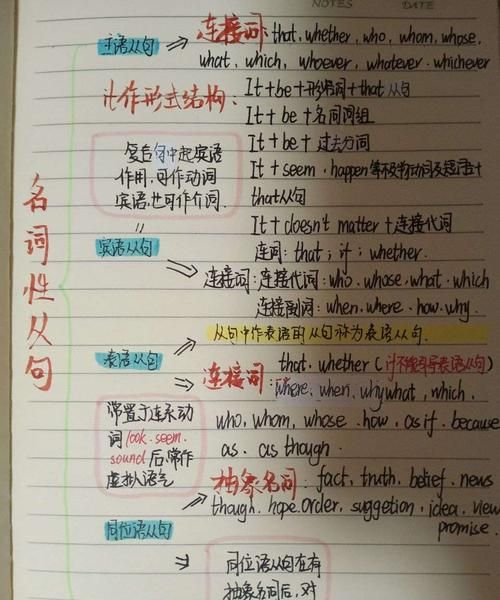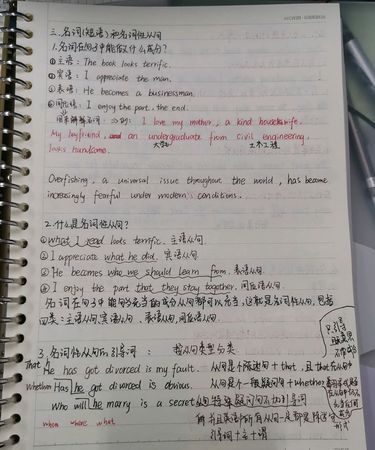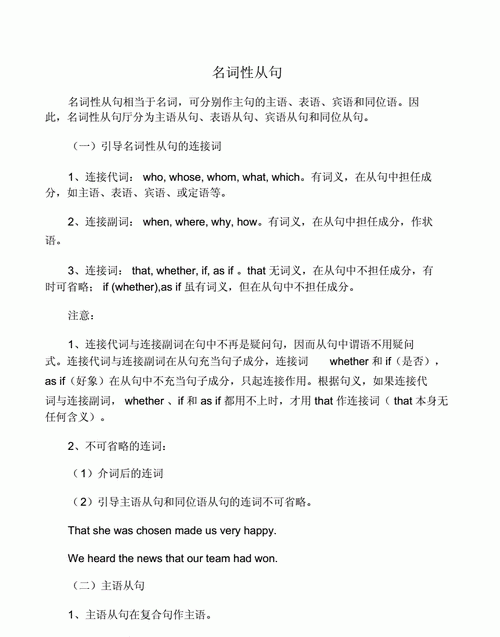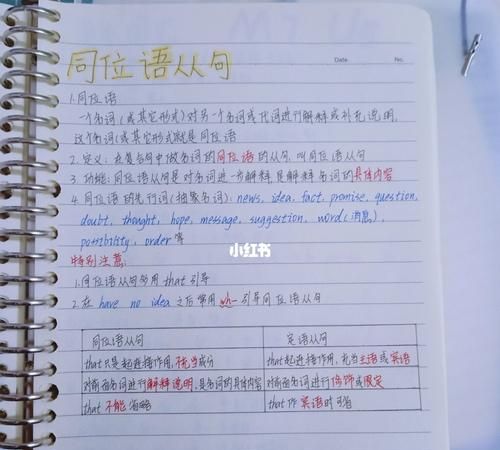本文目录
六年级上册英语语法知识点归纳
名词性从句相当于名词,可分别作主句的主语、表语、宾语和同位语。因此,名词性从句可分为主语从句、表语从句、宾语从句和同位从句。
一、引导名词性从句的连接词
1. 连接代词:who, whose, whom, what, which.有词义,在从句中担任成分,如主语、表语、宾语、或定语等。
2. 连接副词:when, where, why, how.有词义,在从句中担任成分,作状语。
3. 连接词:that, whether, if, as if.that 无词义,在从句中不担任成分,有时可省略;if (whether), as if虽有词义,但在从句中不担任成分。
注意:连接代词与连接副词在句中不再是疑问句,因而从句中谓语不用疑问式。连接代词与连接副词在从句充当句子成分,连接词whether 和if(是否),as if(好像)在从句中不充当句子成分,只起连接作用。根据句义,如果连接代词与连接副词,whether、if 和as if都用不上时,才用that作连接词(that本身无任何含义)。
二、主语从句
1. 主语从句在复合句作主语。
e.g. Who will go is not important.
2. 用it作形式主语,主语从句放在句末。
e.g. It doesn‘t matter so much whether you will come or not.
3. that引导主语从句时,不能省略。
e.g. That he suddenly fell ill last week made us surprised.
三、表语从句
1. 表语从句在复合句中作表语,位于系动词之后。
e.g. The question was who could go there.
2. 引导表语从句的连接词that有时可省去。
e.g. My idea is (that) we can get more comrades to help in the work.
四、宾语从句
1. 宾语从句在复合句中作宾语。引导宾语从句的连词that一般可省略。
e.g. I hope (that) everything is all right.
2. 介词之后的宾语从句,不可用which或if连接,要分别用what或 whether.
e.g. I’m interested in whether you‘ve finished the work……
I’m interested in what you‘ve said.
3. whether与if都可以引导宾语从句,常可互换。但下面情况不能互换。
(1)宾语从句是否定句时,只用if,不用whether.
e.g. I wonder if it doesn’t rain.
(2)用if 会引起误解,就要用whether.
e.g. Please let me know whether you want to go.(此句如果把whether改成if,容易当成条件句理解)
(3)宾语从句中的whether 与or not直接连用,就不能换成if;不直接连用,可换。
e.g. I don‘t know whether or not the report is true.
I don’t know whether/ if the report is true or not.
(4)介词后的.宾语从句要用whether引导。whether 可与不定式连用。whether也可引导主语从句、表语从句、同位语从句,还可引导让步状语从句,以上均不能换成if.但引导条件从句时,只能用if,而不能用whether.
e.g. It depends on whether we have enough time.
They don‘t know whether to go there.
Please come to see me if you have time.
五、同位语从句
同位语从句在句中作某一名词的同位语,一般位于该名词(如:news, fact, idea, suggestion, promise等)之后,说明该名词的具体内容。
e.g. I have no idea when he will be back.
The fact that he had not said anything surprised everybody.

有关从句的重要知识点总结
【从句】分为三种:【状语从句】,【定语从句】和【名词性从句】。【名词性从句】是一种具有名词功能的非独立分句,它在复合句中能担任主语、宾语、表语、同位语、介词宾语等,因此根据它在句中不同的语法功能,【名词从句】又可分别称为【主语从句】、【宾语从句】、【表语从句】【同位语从句】。
名词性从句一向是NMET中的重要考点.通过对近几年高考试题的分析,名词性从句主要考察:语序问题,连接词的选用,从句的时态和语态问题,还有就是名词性从句与其他从句特别是定语从句的区别,我们先看一下一组句子:
1 .a we know, there is no life on the Mars
a.as b.which c.what d. that
2. What we know is that there is no life on the Mars.
3 .As is known ,there is no life on the moon.
4 .It is known that there is no life on the Mars
5 What is known is that there is no life on the Mars.
我觉得这组句子是复习名词性从句的很好的例子,它主要考察的是名词性从句与其他从句的区别和连接词的选择,既然名词性从句在句子中担任主语、宾语、表语、同位语、介词宾语,所以除充当同位语从句外,它在句中在语法上或意义上是不可缺少的。如上述的2,4,5题,在确定了从句类型之后,我们再确定连接词,连接词分为:
1.从属连词(只起引导作用不充当成分的that, whether和 if,as if只引导表语从句)
2.连接代词(what, whatever, who, whoever, whom, whose, which)
3.连接副词(when, where, how, why)
下面我们来具体谈谈名词性从句:
(一) 主语从句
在句中充当主语的从句是主语从句。
That we should use modern technology is a big issue.(that 引导主语从句不可省)
Whether he will come is not clear.(引导主语从句的whether放在句首不能用if 代替)
What surprised me most was that such a little girl could play the violin so well.
Whatever was said here must be kept secret.
When he will come is still unknown.
It is necessary that we should learn some English grammar.
一般来讲what/who等含特指意义,whatever/whoever等含泛指意义,意为“无论….”
It is generally considered unwise to give a child __C__he or she wants.
A. however B What C whatever D whichever
在主语从句中还要特别注意it作形式主语的情况,用 it 作形式主语的that- 从句有以下四种不同的搭配关系:
• a. It + be +形容词+ that-从句
It is necessary/ important / obvious that…
It is obvious that conductors and insulators are both important in industry.
很明显导体和绝缘体在工业中都很重要。
• b. It + be + -ed 分词+ that-从句
It is believed/ known to all /said/ reported that…
It is thought that he is the best player
大家都认为他是最好的选手
• C.It + be +名词+ that-从句
It is common knowledge/ a surprise / a fact that
It is common knowledge that the whale is not a fish
鲸鱼不是鱼,这是常识
• d. It +不及物动词+ that-分句
It appears/ happens/ occurred to me that…
It now appears that they are in urgent need of help.
看起来他们急需帮助。
(二) 宾语从句
宾语从句在句中充当宾语的成分。宾语从句可作谓语动词的宾语,也可作介词的宾语,也可作动词不定式等非谓语动词形式的宾语,还可作某些形容词的宾语从句。
Jenny thought (that) her teacher was unfair.
It all depends on whether they will support us.(不能用if替代,作介词宾语不能用if)
I am sure (that) he won’t mind.
(三)表语从句
放在系动词后作表语的从句。
The reason why the little actress has been such a success is that she is both clever and hard-working.
That’s what he is worried about.
That’s why I was late.
(四) 同位语从句
在复合句中用作同位语的从句叫同位语从句。它一般跟在某些名词后面,用以说明该名词表示的具体内容。可以跟同位语从句的名词通常有new,idea,fact,promise,question,doubt,thought,hope,message,suggestion,word(消息),possibility等。
The idea that England stands for fish& chips…is past.(高二课文unit5 THE BRITISH ISLES)
The problem whether we should continue to do the experiment has been solved.(不能用if)
名词性从句中的需要注意的以下三点:
(1) what与that
what 在名词性从句中要充当成分,that 在名词性从句中不充当成分也没有意义,只起连接作用,但连接主语从句以下几种情况that不可省:
a.引导主语从句放在句首时。
b.当一个句子有两个或多个并列的宾语从句时,引导第二个和以下几个从句的that不可省略。
c.由it作形式宾语时,引导的宾语从句中,that不可省。
d.引导同位语从句时,that不可省。
(2) whether与if
whether与if 均为"是否"的意思。 但在下列情况下,whether 不能被if 取代:
a. whether引导主语从句并在句首
b. 引导表语从句
c. whether从句作介词宾语
d. 从句后有"or not"
Whether he will come is not clear.
(3) Suggest, order 等其相关词性的相应的名词性从句的时态。
表示建议,命令,要求的动词的宾语从句,名词的表语从句,同位语从句的时态要用should do, should可以省略。
I suggest that we (should) hold a meeting next week。
The suggestion that he be invited was rejected。
从句的学习非一日之功,平时应加强对从句语法特征和意义特征的思考。对于从句,我们应先确定从句的类型,回忆相关用法,再确定正确的选项。

英语名词性从句课件
我们在上一期中说过,根据 在句中不同的语法功能 ,名词性从句可以分为 主语从句、宾语从句、表语从句和同位语从句 。根据名词性从句的构成可以分为: that从句,whether 从句和疑问词引导的从句 。但我们要特别注意以下几点:
1、that从句不可做介词的宾语,只能用whether 从句或疑问词引导的从句。
例1. I am worried about whether he can do it .
那如果硬要用that从句怎么办呢?且请看
① 在介词之后加the fact ,结构为: 介词+ the fact+ that从句
I am worried about the fact that he doesn’t study.
② 不加 the fact ,对that从句进行如下变化:去掉that,之后的主语变成所有格,动词变成动名词。
例:I am worried about the fact that he plays around all day →
I am worried about his playing around all day.
注意:
A. 若that从句有助动词do、does、did、will和would时,直接去掉
例. I am worried about the fact that he doesn’t study. →
I am worried about his not studying.
B.
若有may 和can助动词时。May变成be likely to;can变为 be able to。
例. I am happy about the fact that he may come
I am happy ab
out his being likely to come
③ 直接去掉介词。 形成 be + adj.+ that从句.
例. I am worried that he plays around allday.
三个大招,大家都理解了吗?
特例:
In that =because 因为
例. He is talented in that he can speak five different languages.
Exceptthat 只可惜,除了
例. He is nice except that sometimes helies.
2、同位语从句和定语从句要分清楚。
前面我们提到了,名词性从句包括 同位语从句 ,定义:在复合句中充当同位语的名词性从句称为同位语从句。但是很多同学却容易把 同位语从句和定语从句 搞混了,我查阅了很多区分的方法,总结了一下,发现下面两种最适用。
大家能区分这两个句子哪个是同位语吗?
1.The news that he will come back is true.
2.The news that he told me is true.
区分方法一:
同位语从句中 从句是对被修饰词进行补充说明,是被修饰词的具体内容。 定语从句中 从句是起限定作用,不是被修饰词的具体内容。
两句中的被修饰的词都是news,但是第一句中的从句that he will come back是news的具体内容(补充说明:消息是他将会回来);而第二句that he told me就不是news的具体内容了,而是限定他告诉我的消息。
另外,可以跟同位语从句的名词通常有 news,idea,fact,promise,question,doubt,thought,hope,message,suggestion,words(消息),possibility等抽象名词。
具体区别如下:
区分方法二
如果上面通过上面还区分不出来, 把被修饰的词和从句用be动词连成一句话,句子成立的就是同位语从句,不完整的是定语从句.这个方法大部分句子都适用。
比如,第一句就是 the news is that he will come back(消息是他将会回来)句子完整.第二句是 the news is that he told me(消息是他告诉我,告诉什么却没有说)句子不完整.所以第一句是同位语从句,第二句是定语从句了。
总结:到这一期可做名词的词类就讲完了,总共有7类,分别是: 名词、代词、动名词、动词不定式、名词性从句、名词短语以及表距离的地点副词短语 都可以做主语。大家都记住理解了吗?
欢迎大家留言讨论,下期再见

名词性从句高考考点统计
名词性从句高考考点及专项练习
名词性从句相当于名词,可分别作主句的主语、表语、宾语和同位语。因此,名词性从句成分为主语从句、表语从句、宾语从句和同位从句。
(一)引导名词性从句的连接词
1、连接代词:who, whose, whom, what, which。有词义,在从句中担任成分,如主语、表语、宾语、或定语等。
2、连接副词:when, where, why, how。有词义,在从句中担任成分,作状语。
3、连接词:that, whether, if, as if。that 无词义,在从句中不担任成分,有时可省略;if (whether), as if虽有词义,但在从句中不担任成分。
(二)主语从句
1、主语从句在复合句作主语。
e.g. Who will go is not important.
2、用it作形式主语,主语从句放在句末。
e.g. It doesn’t matter so much whether you will come or not.
3、that引导主语从句时,不能省略。
e.g. That he suddenly fell ill last week made us surprised.
注意:that从句作主语和宾语时,可以用it 来替换成以下几种结构表达。
(A)It is clear/certain/likely/true/surprising that…
(B)It is a pity/shame/good idea/no wonder that ...
(C)It is said/reported/ believed/known/thought/suggested that …
(D)It seems/happens that。
如: It happened that I went out last night.
It is said that China will win in the World Cup.
(三)表语从句
1、表语从句在复合句中作表语,位于系动词之后。
e.g. The question was who could go there.
(四)宾语从句
1、宾语从句在复合句中作宾语。引导宾语从句的连词that一般可省略。
e.g. I hope (that) everything is all right.
2宾语从句中的连接词that有时可省有时又不可省,在以下几种情况中that不能省略:(A)当that从句和主句谓语动词之间有插入词语或者从句主语之间有插入语时,that不可省略;(B)当that 从句与另一名词性从句并列作宾语时,that不能省;(C)当that作介词宾语时,that不可省掉。如:
He judged that, because he was a child, he did not understand wine
Everyone knew what happened and that she was worried.
The reason lies in that she works harder than the others do.
3、whether和if的用法。
1)whether和if在宾语从句中可以互换,但是作介词宾语时连接词一般用whether。如:
It all depends on whether they will come back.
2)后面直接跟or not 时用whether。如:
I didn’t know whether or not he had arrived in Wuhan.
3)主语从句、表语从句、同位语从句中只能用whether。如:
Whether the meeting will be put off has not been decided yet.
The question is whether they have so much money.
We ought to discuss carefully the question whether we can do it or not.
4)whether常与or连用表示一种选择,if不能这样用
The question of whether they are male or female is not important.
5)whether也可与动词不定式连用但if不能。如:
I have not decided whether to go or not.
6)宾语从句提前时用whether不用if。如:
Thank you, but whether I’ll be free I’m not sure at the moment.
7)引导条件状语从句时, 必须用if .
If it rains tomorrow , we won’t go to the Summer Palace .
(五)同位语从句
同位语从句在句中作某一名词的同位语,一般位于该名词(如:news、fact、suggestion、truth、plan、belief、doubt、possibility、idea 、promise等)之后,说明该名词的具体内容。
e.g. I have no idea when he will be back.
The fact that he had not said anything surprised everybody.
注意: 同位语从句与定语从句中that的区别。
同位语从句中的连词that只起连接作用,在从句中不担当任何句子成分;而定语从句中的关系代词that在句中做宾语或主语,定语与先行词有修饰关系。如果句子是同位语从句,就应用连词that而不能用which.同位语从句一般放在表具体含义的名词后解释名词的含义或内容,如以下名词:news、fact、suggestion、truth、plan、belief、doubt、possibility、idea、promise等,而定语从句只是对先行词的限定和修饰。如:
They expressed the hope that they would come to visit China again. The hope she expressed is that they would come to visit China again.
(六)疑问词 + ever和no matter + 疑问词的区别。
①疑问词 + ever可引导名词性从句,在从句中要充当一定的部分。如:
Whoever breaks the rule must be punished.
You can choose whatever you like in the shop.
②疑问词 + ever还可引导让步状语从句。如:
Whoever breaks the rule, he must be punished,
Whatever you do, you must do it well.
③no matter + 疑问词只能引导让步状语从句。如:
No matter what you do, you must do it well.
No matter who breaks the rule, he must be punished.
(七)名词性从句中主句和从句的时态一致
(1)宾语从句中主句和从句的时态保持一致,但如果从句中表示提示的是客观现象,虽然主句是过去时态,从句仍用一般现在时。如:
Hello,I didn’t know you were in London. How long have you been here?
The teacher told us that light travels at a very high speed.
(2)主语从句作主语相当于单数第三人称作主语,谓语动词用单数,如果由and 连接两个或两个以上的主语从句作主语时,谓语动词用复数;由两个或多个连接词引导一个主语从句,谓语动词用单数。如:
When the meeting will begin ______not been decided yet. (has not )
When they will start and where they go _______not been decided yet. ( have not)
When and where the meeting will begin _______not been decided. (has not )
(八)、名词性从句的词序
名词性从句在句中要用陈述句语序。如:
He asked me what was the matter with me.
We’ve heard the news that we’ll move into the new house.
Whatever you say will interest us all.
(九)that和what的区别。
that 引导名词性从句时,在主从句中不以当任何句子成分,也没有任何含义;而what引导名词性从句时,在主从句中都要充当一定主语、宾语、表语或定语,what的意思是:“什么, …的….”
What surprised me most is her cheerful expression on her face.

以上就是关于名词性从句知识点笔记 ,六年级上册英语语法知识点归纳的全部内容,以及名词性从句知识点笔记 的相关内容,希望能够帮到您。
